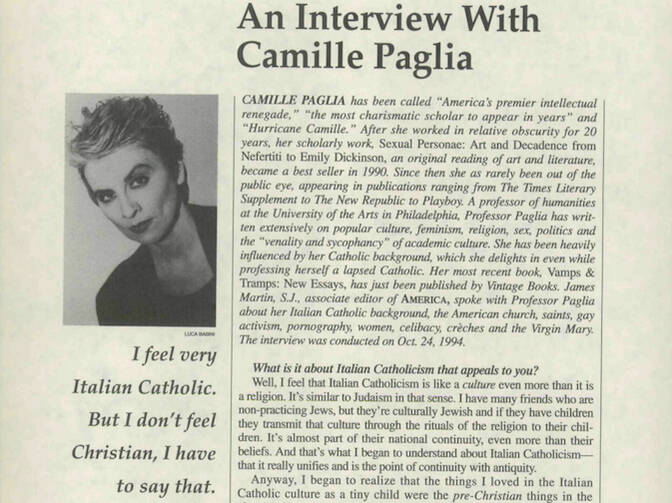Those of you with long memories might have recognized that Sean Salai, S.J., a former associate editor, is the second Jesuit scholastic to interview Camille Paglia for America.
In 1994, Camille Paglia, a professor at the University of the Arts in Philadelphia, was seemingly everywhere. Her book Sexual Personae, an original reading of art and literature, had become a surprise best seller in 1990, and, in the wake of its publication, she wrote for outlets as varied as the Times Literary Supplement and Playboy. Also in 1994, I was a Jesuit scholastic working at America as an associate editor. Sexual Personae was quite unlike anything I had ever read: a stew of impressive scholarship on art and literature, piquant observations on gender issues and provocative insights into pop culture. I didn’t agree with everything the author wrote, but I was never bored, and rarely did I read a page that didn’t prompt me to say to myself, “I never thought of it that way.”
When I proposed to George W. Hunt, S.J., then the editor in chief, that we interview her, he—and I recall this distinctly--threw his head back and laughed. George had known Professor Paglia’s father as a fellow professor at Le Moyne College.
Our interview was conducted over the phone, with an antiquated tape recorder that included a suction cup on the receiver, and Professor Paglia spoke in her trademark rapid-fire manner about her Italian-Catholic background, the American church, saints, gay activism, pornography, women, celibacy, creches and the Virgin Mary.
It took days to transcribe the interview, and by the time I had finished I had moved to Boston to start my studies in theology. The interview, which ran for many pages in the magazine, was something of a bombshell: one of the longest she had done, and one of the first in which she talked about her Catholic background so openly, and so deeply. Given the topics that Professor Paglia covered, and the verve and bluntness with which she discussed them, George decided to devote his entire “Of Many Things” column to introducing the article, so as to prepare anyone’s otherwise delicate sensibilities for the onslaught. He began his column with the words, “Hold onto your hats!”
You can read the full interview in the attached PDF.








